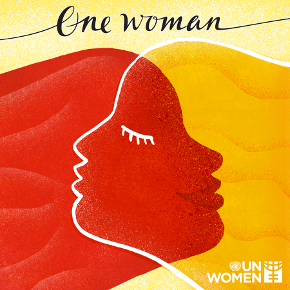
Credit: UN Women
March 8, 2013 is International Women’s Day, a day when the world reflects on the progress made and obstacles that remain in achieving gender equality and respect for women’s human rights. This year, the UN has planned a variety of events in honor of this day, and its human rights experts have taken the opportunity to highlight the need for continued action to address violence against women, the theme of this year’s International Women’s Day.
On March 5, UN Women Executive Director Michelle Bachelet released a statement that “enough is enough” with regard to violence and discrimination against women. While underscoring her optimism at the rising level of awareness of women’s rights issues, Ms. Bachelet expressed her outrage that women and girls continue to face such high levels of violence, discrimination, and exclusion. She also underscored that “a promise is a promise;” countries must comply with treaties they have ratified and respect women’s rights.
Her statement came soon after the start of the 57th session of the Commission on the Status of Women, held from March 4-15, 2013 at the UN Headquarters in New York City. This year’s Commission focuses on eliminating and preventing violence against women and girls, which affects seven in ten women worldwide. [UN Women] The Commission will host the UN’s official International Women’s Day observance from 10:00 AM to 12:00 PM EST, which will be webcast live.
The UN treaty body focused on women’s rights – the Committee on the Elimination of Discrimination against Women (CEDAW Committee) – and various UN human rights experts (“special procedures“) issued a joint statement in connection with the ongoing Commission on the Status of Women session:
While the Commission on the Status of Women deliberates on how to prevent and respond to violence against women, we the expert mechanisms of the UN human rights system cannot but recall that there is a long way to go before women and girls can enjoy equal rights and freedoms as men, as well as respect for their dignity. In the context of the post 2015 development agenda, the role of CEDAW and other players in the elaboration of indicators on violence against women is of paramount importance. In the meantime, States should focus their efforts on the implementation of CEDAW and other relevant instruments. We, therefore, call on Member States to heed the voices of all women and girls demanding with ever stronger insistence and urgency their human rights. This is now urgent for implementing their rights. We are simply the echo of their voices.
The UN High Commissioner for Human Rights, Navi Pillay, emphasized the role of women in economic growth at her opening statement at a side event on gender equality and women’s empowerment at the UN Human Rights Council session. In a separate statement on the occasion of International Women’s Day, the High Commissioner drew attention to the widespread problem of violence against women, stating:
Violence against women is one of the most pervasive violations of human rights. And yet the authorities responsible for protection and prosecution too often meet such acts with indifference.
It is not enough simply to pass legislation. Almost every country in the world has some kind of relevant legal framework in place. Governments know they have an obligation under international law to prevent these crimes by working to eliminate underlying attitudes that discriminate against women and girls. Yet, in many countries, politicians, police, the judiciary and ordinary men — and women too — collectively shrug and look away when they hear of rapes and other sexual or gender-based crimes.
Temporary outrage is not enough. Serious investigations into violent acts against women should become the norm, not just something police forces do when the media highlight a particular case.
We need to shake this global torpor and wake up to reality: every minute of every day, on every continent, women and girls are raped and abused, trafficked, tortured and killed. This doesn’t just happen in far-away conflicts. It happens in sophisticated capital cities, as well as in small towns and villages and the house next door.
UN Secretary-General Ban Ki-moon also released a statement reiterating the importance of ending violence against women and championing his UNiTE to End Violence Against Women campaign. As part of the campaign, Latin American and Caribbean artists composed a song, “Joy,” promoting the idea of joy as a human right. UN Women is releasing a song, “One Woman: A song for UN Women,” for the occasion as well.
International Women’s day began through ties to labor and worker movements, with the first celebration in 1909 honoring the anniversary of a garment workers’ strike in New York City. [UN Women Watch] It has since expanded in thematic and geographic scope, with the United Nations celebrating its first International Women’s Day in 1975. [UN Women]
The past century has witnessed great strides in promoting gender equality. Since 1975, there have been four World Conferences on Women, hosted in Mexico City, Copenhagen, Nairobi, and Beijing. The UN adopted the International Convention on the Elimination of Discrimination Against Women (CEDAW) in 1979. To date, 187 countries have ratified the treaty. And in July 2010, the UN General Assembly created UN Women in order to empower women and advance gender equality. [UN Women]
Other regions of the world have also taken steps to uphold women’s equality. In the Americas, 32 countries have ratified the Inter-American Convention on the Prevention, Punishment and Eradication of Violence Against Women, and 28 African nations have ratified the Protocol on the Rights of Women in Africa.
See this page for a full list of UN events, and to find an International Women’s Day event near you, visit the International Women’s Day site.
